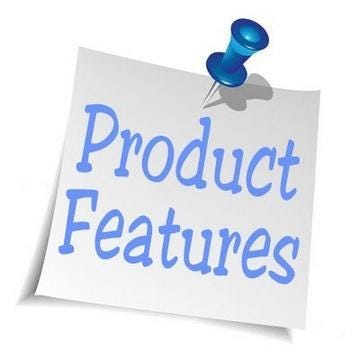
I Dare You to Talk About Your Features
Increase your conversion rate with feature messaging
Proper product positioning stems from the excellent articulation of your company’s value proposition and how you are solving your customers’ pain points. This has brought about the vilification of feature based messaging prompting most Product Marketers to largely anchor their messaging purely on their solutions. As much as solutions messaging is great and works for most customer segments appealing to 84% of the buyers in the product adoption life cycle, we have a small percentage of users in the early phase of the adoption life cycle who heavily focus on feature messaging to make their purchasing decision or try out that new product just launched into the market.
“Don’t talk about features, talk about your solutions and benefits” is a statement we’ve all heard and read as we explore different types of content on marketing best practices.

In this piece I’ll be taking you through why it’s important to incorporate feature messaging in your product communication, who you should be targeting with this type of messaging and the impact it has on your overarching goal as a company.
“Feature messaging is the intentional act of prioritizing a product’s features and functionalities in the product’s communication/messaging strategy”
Who is Feature Led Messaging meant for?
Don’t get me wrong, as a certified Product Marketing Manager I know the importance of anchoring your strategic messaging on your key benefits to give life to your value propositions for each of your customer and market segments. With that stated, it’s important to also explore how feature led messaging can work to your brand’s advantage. I’ll caveat this assertion by stating that feature messaging is particularly suited for a specific group of people in the product adoption life cycle. These are the technologists and visionaries also known as the innovators and early adopters respectively. This means that, out of the 100% of buyers you’ll be positioning your product to, approximately 16% of them find feature messaging more appealing as opposed to the famous benefit or solution messaging. Here’s why;
Technologists are a group of people who are always actively searching for the next new things that will help them solve their problem better than what they are currently using. What this means is they are intentional in exploring your product features to see what in your product will solve that problem and deliver the solutions they need. Using feature messaging for this group will help you convert users easily. This also helps you define your product narrative propelling the rest of the buyers in the right direction. After the innovators, the early adopters have the vision to see that your product will help them solve their pain points when told and shown how the product works. This points us back to feature messaging. Clearly showcasing your product or platform’s functionalities to this group will help them fully understand how it will benefit them.
Visionaries are the first people in their industry segment to see the potential of the new technology. Fundamentally, they are themselves as smarter than their opposite numbers in competitive companies….they do not expect, therefore, to be buying a well tested product with an extensive list of industry references. Indeed, if such a reference base exists it may actually turn them off indicating that for this technology, at any rate, they are already too late.
(Crossing the Chasm page: 41,42)
Once you’ve crossed the chasm, it’s wise to now move from feature led messaging to a combination of both solution messaging the feature messaging since the early majority and late majority want to be told which of their problems you’ll be solving and aren’t keen on reading through your detailed feature messaging to uncover that. Combine a bit of your feature messaging with a lot of social proof to try to win most of the conservatives over as well as the laggards AKA the skeptics. Offering details of your product features is what will provide the users/buyers the needed information that will make your narrative believable.
Change in customers’ buyer journey
Most of the buyers are out here googling our solutions with the hopes of uncovering elaborate product descriptions that would help them understand how we’ll be solving their problems. This means feature messaging does play a role in a company’s conversion rate. The challenge most buyers are currently facing is most companies use solution messaging on their website and other marketing channels and provide less information sources that actually detail the features and functionalities of their platforms/products. It’s important to point out that most of these buyers search for sources such as product demos, they review company websites to try and uncover details of the product and actually use less of the social media marketing collateral most companies focus on. This is because most of the marketing collaterals do not relay the key product features the buyers want to explore.

The best way of infusing feature messaging in your information sources is by talking about your features in the context of the problem you are solving. Some companies that are doing this well include ; Hubspot and Zendesk. Looking at this B2B buyer journey map , it’s been stated by Forrester that 65%- 90% of the buying process is done before speaking to any sales person. This is where product marketing and marketing play a bigger role in educating the buyers towards making that purchase through a concept referred to as buyer enablement.
Buyers’ trust levels of information sources
Most buyers tend to trust product demos more compared to other marketing collaterals. This preference is attributed to how watered down and fluffy most marketing pieces are and how product demos always offer the key product insights (feature messaging) they need to know before making the purchasing decision. Surprisingly, user reviews come up among the most trusted information sources and it is important for Product Marketers to use user reviews to get social proof into their messaging which will increase their product conversion rates. Referrals from friends and family also play an important role in the decision making process of the buyer especially in the African context. This is because we tend to operate and make decisions communally.

Conclusion
Communicating the solutions you’re providing for your customers is key. But are you also equipping your buyers with the necessary product details that will help them understand more about your offerings? Are you able to justify the beautifully displayed social proofs (we never miss those :-) )on your website, the case studies and your user reviews? Each level of the product adoption cycle demands a different type of messaging that aligns with how the people in each category consume information sources. What most companies are missing out on is showcasing their products’ functionalities to help buyers fully understand their products better. Being tactical with your feature messaging will work to your advantage when combined with solution messaging. Your target market gets to understand your products better which will increase your conversion rate and drive revenue for your company.
